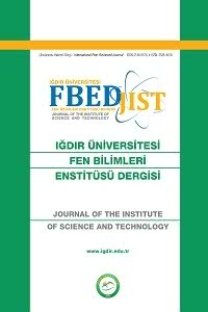4-Formilbenzoat’ın Co(II), Cu(II) ve Zn(II) ile İzonikotinamid Komplekslerinin Sentezi; Spektroskopik, Termik Özelliklerinin ve Antibakteriyel Etkinliklerinin İncelenmesi
Bu çalışmada Co(II), Cu(II) ve Zn(II) metallerinin 4-formilbenzoik asit ve izonikotinamid ile üç adet kompleksi sentezlendi: Co(C6H6N2O)2(H2O)4](C8H5O3)2·2H2O, Cu2(C8H5O3)4(C6H6N2O)4, Zn(C8H5O3)2 (C6H6N2O), sentezlenen üç kompleksin yapısı elementel analiz, FT-IR spektroskopisi ve termik analiz ile sonucunda karakterize edildi. Yapıları karakterize edilen komplekslerin Esherishia coli (E. coli) ve Staphylococcus aureus (S. aureus) bakteri türleri üzerinde antibakteriyel özellikleri incelenmiştir.B3 vitamini olarak bilinen nikotinamid’in izomerlerinden biri olan izonikotinamid, γ pozisyonunda amid grubu (-CONH2 ) içeren bir piridin türevidir ve antitüberküloz, ateş düşürücü, fibrinolitik ve antibakteriyel özellikler gösterir (Ahuja and Prasad, 1976; Aguiar ve ark.., 2015). Piridin ve türevlerini içeren kompleksler gösterdikleri biyolojik aktiviteleri sayesinde biyolojik olarak önemli rol oynamaktadır (Kismali ve ark al., 2012). Biyolojik olarak önemli olan bu ligandların metal komplekslerinin bazen serbest ligandlara göre daha etkili olduğu bilinir (Ahuja and Prasad, 1976; Al-Saif and Moamen S. Refat, 2012; Surendra Dilip ve ark, 2016; Altun and Şuözer, 2017). Metal komplekslerinin Esherishia coli, Pseudomonas aeruginosa, Staphylococcus pyogones ve Candida Albicans’a karşı antibakteriyel aktivitelerinin araştırıldığı bir çalışmada
Anahtar Kelimeler:
Geçiş Metalleri, 4-Formilbenzoik Asit, İzonikotinamid, Antibakteriyel, Antibakteriyel
Synthesis Of Izonicotınamide Complexes Of 4-Formilbenzoate with Co (II), Cu (II) And Zn (II); Investigation of Spectroscopic, Thermal Properties and Antibacterial Activıties
In this work, three complexes of Co (II), Cu (II) and Zn (II) metals with 4-formylbenzoic acid and isonicotinamide were synthesized: Co(C6H6N2O)2(H2O)4](C8H5O3)2·2H2O, Cu2(C8H5O3)4(C6H6N2O)4, Zn(C8H5O3)2 (C6H6N2O), the structure of the three complexes synthesized was characterized as the result of elemental analysis, FT-IR spectroscopy and thermal analysis. The antibacterial properties of the constricted complexes on Esherishia coli (E. coli) and Staphylococcus aureus (S. aureus) bacterial species were investigated.
Keywords:
Transition Metals, 4-Formylbenzoic Acid, Isonicotinamide, Antibacterial,
___
- Aguiar I de, Tavares A, Roveda AC, da Silva ACH, Marino LB, Lopes ÉO, Pavan FR, Lopes LGF, Franco DW. 2015. Antitubercular activity of Ru (II) isoniazid complexes. European Journal of Pharmaceutical Sciences 70: 45–54.
- Ahuja IS, Prasad I. 1976. Isonicotinamide complexes with some metal(II) halides and pseudohalides. Inorganic and Nuclear Chemistry Letters 12: 777–784.
- Al-Saif FA, Moamen S. Refat. 2012. Ten metal complexes of vitamin B3/niacin: Spectroscopic, thermal, antibacterial, antifungal, cytotoxicity and antitumor studies of Mn(II), Fe(III), Co(II), Ni(II), Cu(II), Zn(II), Pd(II), Cd(II), Pt(IV) and Au(III) complexes. Journal of Molecular Structure 1021: 40–52.
- Altun Ö, Şuözer M. 2017. Synthesis, spectral analysis, stability constants, antioxidant and biological activities of Co (II), Ni (II) and Cu (II) mixed ligand complexes of nicotinamide, theophylline and thiocyanate. Journal of Molecular Structure 1149: 307–314.CLSI (Clinical and laboratory Standards Institute). 2005. Performance Standard for Antimicrobial Susceptibility Testing. Fifteenth Informational Supplement. Document M100-S15, CLSI, Wayne, PA.
- David, A.P., McCuen, J.P. 1988. Manual of BBL Products and Laboratory Procedures. Sixth Edition. U.S.A, 67-72.
- Hökelek T, Yılmaz F, Tercan B, Sertçelik M, Necefoğlu H. 2009a. Tetraaquabis(isonicotinamide-κN1)cobalt(II) bis(4-formylbenzoate) dihydrate. Acta Crystallographica Section E: Structure Reports Online 65: m1130–m1131.
- Hökelek T, Yılmaz F, Tercan B, Sertçelik M, Necefoğlu H. 2009b. catena-Poly[[(4-formylbenzoato-κO1)(isonicotinamide-κN1)zinc(II)]-μ-4-formylbenzoato-κ2O1:O1′]. Acta Crystallographica Section E: Structure Reports Online 65: m1399–m1400.
- Kismali G, Emen FM, Yesilkaynak T, Meral O, Demirkiran D, Sel T, Kulcu N. 2012. The cell death pathway induced by metal halide complexes of pyridine and derivative ligands in hepatocellular carcinoma cells - necrosis or apoptosis? European Review for Medical and Pharmacological Sciences 16: 1001–1012.
- Mohamed GG, Omar MM, Hindy AMM. 2005. Synthesis, characterization and biological activity of some transition metals with Schiff base derived from 2-thiophene carboxaldehyde and aminobenzoic acid. Spectrochimica Acta. Part A, Molecular and Biomolecular Spectroscopy 62: 1140–1150.
- Murray, P.R., Baron, E.J, Pfaller, M.A., Tenover, F.C., Yolken, R.H, 1999. Manual of Clinical Microbiology 7th Edition. ASM: Washington DC.
- Sertçelik M, Çaylak Delibaş N, Necefoğlu H, Hökelek T. 2013. Bis(μ-4-formylbenzoato-κ2O:O′)bis[(4-formylbenzoato-κ2O,O′)bis(isonicotinamide-κN1)copper(II)]. Acta Crystallographica Section E: Structure Reports Online 69: m290–m291.
- Sugeçti, S and Koçer, F. 2015 Antimicrobial Activity Against Clinical Pathogenic Microorganisms of Commercially Important Natural Extract. Journal of Anatolian Natural Sciences, 6: 28-34
- Surendra Dilip C, Thangaraj V, Paul Raj A. 2016. Synthesis, spectroscopic characterisation, biological and DNA cleavage properties of complexes of nicotinamide. Arabian Journal of Chemistry 9: S731
- ISSN: 2146-0574
- Yayın Aralığı: Yılda 4 Sayı
- Başlangıç: 2011
- Yayıncı: -
Sayıdaki Diğer Makaleler
Hürrem Turan AKKOYUN, Aydin Sukru BENGU, Aykut ULUCAN, Mahire BAYRAMOGLU AKKOYUN, Suat EKİN, Yusuf TEMEL, Mehmet ÇİFTÇİ
Linalool Baskılı Polimer Sentezi
Glikoz Yağ Asidi Esterlerinin Bitkisel Bazlı Yenilebilir Yağların Termal Bozunmasına Etkisi
Kuru Gıdaların Rengini Muhafaza Etmeye Yönelik Yeni bir Teknik: İndirgen Atmosferik Kurutma
Su Kıtlığına Maruz Bırakılmış C3 ve C4 Bitkilerinin Fotosentetik Aktivitelerinin Belirlenmesi
Physicochemical Properties of Soy Protein Concentrate Treated with Ultrasound at Various Amplitudes
